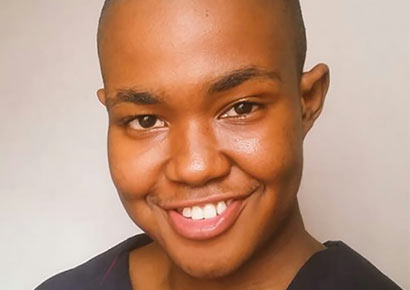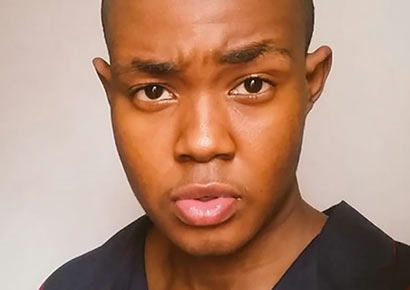My trans story | Becoming the man I always imagined myself to be
 The South African public is still reluctant to fully accept the diversity of our LGBTQIA+ realities. But that hasn’t deterred many members of the trans community from proudly owning their true gender identities.
The South African public is still reluctant to fully accept the diversity of our LGBTQIA+ realities. But that hasn’t deterred many members of the trans community from proudly owning their true gender identities.
Take 21-year-old Lwazi Mbokazi, a transgender man from Durban who is not letting transphobia prevent him from living his authentic life. He’s actively redefining masculinity ‘by living his highest truth’. MambaOnline sat down with Lwazi to find out about his gender affirmation journey and life as a transgender man in one of South Africa’s most queerphobic provinces.
Lwazi is a forensic science and technology student who says that he was five years old when he came to realise that he did not fit into how others were defining him, “although at that time, I didn’t know the terminology to properly articulate my experience.”
He notes that, “Growing up as a black child from a conservative culture doesn’t necessarily expose you to gender expressions beyond cisnormativity [and] I suppressed my transness for a long time.”
As a youngster, Lwazi played with toys society traditionally attributed to boy children and at some point his family started acknowledging his identity.
“At first, they thought it was all just an ‘experimental tomboyish phase’ that I would outgrow. But when their efforts failed to get me to wear dresses and other hyperfeminine things, they eventually gave up the very idea of morphing me into someone I personally didn’t resonate with. And the last thing I remember fondly from my late grandmother was her telling me, ‘you should have been born a boy.’”
Lwazi explains that he only came to realise that he identified as transgender when he was in his late teens. “When the international trans community started protesting for the Bathroom Bill [in the USA] in 2016, and I was 19 at that time, I suddenly realised: ‘Hey, I am actually one of them. In fact, I have been one of them my whole life. This is it. This is me. But now, what does this mean for my lost years? And how I can go about grieving and compensating for that?’”
“I was worried that I would never find love just for being trans”
According to the South African Institute of Race Relations, KwaZulu-Natal is the second most queerphobic province in the country, after the Eastern Cape. The bigotry rife in South African communities has resulted in many not coming out and not reporting the hate crimes they endure. Lwazi, however, had a positive coming out experience with his family.
“When I came out to my parents, their immediate reaction was, ‘We have always known since your childhood’. After that, they just kept on reassuring me about how my happiness will always come first since they didn’t want me to feel shunned or misunderstood to the point where I [might] end up taking my own life.”
While his family has assured him that he has their full support, Lwazi admits that it has been something of a challenge for them to adjust to his new pronoun and the name he has chosen for himself. ‘Deadnaming’ is when people use the birth name of a transgender person instead of the name they have adopted as part of their transition. It’s something many have to face on an ongoing basis. “At first, it was difficult for [my family] to stop misgendering me and using my deadname out of habit. But they have since made efforts to do better,” says Lwazi.
His transitioning experience has also shown him that there isn’t enough being done by the public health sector to accommodate queer bodies, especially trans folk. “One has to travel great distances to receive proper treatment from reliable GPs and therapists. Everyone has the individual responsibility to unlearn their prejudice, but it’s discouraging once you realise that very few people are willing to practice and advocate such unlearning in their own lives for the benefit of the collective and common good.”
 Almost every member of the LGBTQIA+ community has had some experience of queerphobia that has affected them and their life. For Lwazi, transphobia has primarily impacted on his sense of self-worth; damage that he is now working to repair.
Almost every member of the LGBTQIA+ community has had some experience of queerphobia that has affected them and their life. For Lwazi, transphobia has primarily impacted on his sense of self-worth; damage that he is now working to repair.
“At the beginning of my transition, I was worried that I would never find love just for being trans. The romantic desirability of trans people is often harshly questioned and debated, you know? So, my worries were worsened by that even more,” he says. “When such transphobia began to severely affect my sense of self-worth, I decided to start viewing myself as being unconditionally lovable even if my very existence doesn’t align with the world’s views on what it means to be romantically desirable.”
Lwazi is still in the midst of his gender-affirming journey but it’s proving to be exactly what he needed it to be. “My transition has been an exciting experience so far because I am finally becoming the man I have always imagined myself to be. I am finally liberating myself from being limited by transphobia. I am finally allowing myself the safe space to exist unapologetically.”
- Facebook Messenger
- Total398
Leave a Reply